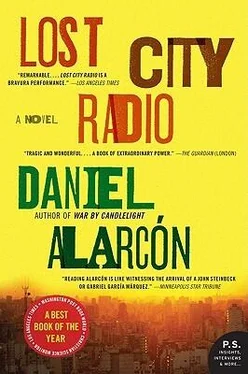“How will we make it home?” Norma asked.
Rey smiled. “Maybe we’ll stay here.”
And, in fact, they did. Norma had just asked him about his trip, and Rey was telling her about a town in the eastern forest where the Indians still knew the old language, where he’d met an old man who had walked him deep into the forest and showed him a dozen new medicinal plants. Norma could sense the excitement, the curiosity in her husband’s voice. The town sounded like a lovely place. “I’d like to see it myself,” she said, then there was a distant rumble. They fell silent. It was somewhere off in the hills, and for a moment, nothing happened. For a moment, they both thought they had imagined this unexplained sound. Then there was another, and then another, a deep shaking, a call and response in the hills. An earthquake? The lights along the street flickered again, and this time, they did not recover. There was a shout from inside the bar. The president had been about to address the nation. He had just cleared his throat when the radio went dead. Inside and outside, the darkness was complete.
LISTEN TO me, youngster. It’s how Trini began all his letters. This was his last one, and Rey kept it with him always. By his bedside, in his wallet, in his briefcase — it migrated among his things, but was always near. Sometimes Rey woke in the middle of the night, took it to the kitchen, and read it there. He pulled it out on the bus, or between classes, or as he waited for his contact in some dingy bar in Miamiville. Trini had missed their June wedding. Rey and Norma left an empty chair for him at the table of honor. Rey’s father read the toast Trini sent from prison. He had missed the tadek mess, though he never would have known who was behind it. He had missed the beginning of Rey’s work at his alma mater, the first steps in his career. He’d missed all of this, and the war’s rude beginnings as well. Of course, there had been other prison breaks since, and other scapegoats, too.
Trini did not cultivate anger. It never appeared in the letters, and yet, for Rey, it was the essential message of the text. Trini wrote with a single fear: that he had accomplished nothing in his life, that he would never have the chance to make up for the wasted time. Nothing notable, exceptional, or even brave. He tended to list his disappointments, and this last letter was no different: the woman who wouldn’t speak to him again, the son who would never visit him. In this last letter, he mentioned the boy by name — something he’d never done before — and wondered if the boy’s mother had changed it. It came down to this: everywhere else, he was forgettable — everywhere except here, in this prison full of men he’d mistreated, men he’d arrested, men who never forgot a slight. In his last letter, Trini told stories. About getting drunk with a bicycle thief in Ciencin. About waking up in the arms of a wealthy heiress in La Julieta. He had almost beat a man to death in The Thousands, and claimed not to remember anything about the incident, except that they’d only just met, and that minutes before, they had been laughing together. None of it mattered, Trini wrote. It was a long letter, four pages of cramped handwriting, full of implied good-byes, confessions, and retractions. But Trini had only one thought, repeated on every page: to survive. To live long enough to walk out of the prison. If he were to pull this off, he wrote, it would redeem a life of mediocrity, a life without substance. It would be an accomplishment.
Trini was serving his second year when he was killed in a prison brawl. When Rey’s grieving was over, he met his contact. “I’m ready,” he said, and took his first trip into the jungle not as a scientist but as a messenger.
IN PREPARATION for his guests, Manau showered and shaved. It was the first time he had done so since his arrival in the capital. He’d spent the previous day and a half shuttling listlessly between his bed and the kitchen table, where his mother sat watch over him, making sure he ate. He did, three times that day with little enthusiasm, then returned to his room, where in his absence, Manau’s father had set up an office to organize his extensive stamp collection. The room was crowded with envelopes, laminating books, and tin boxes of small, obscure tools. A magnifying glass hung from a hook on the wall above his bed. There had been no regular mail ser vice in 1797, and his father’s obsession now struck Manau as absurd. He had received only two letters during his year in the jungle, neither from his father. The old man wouldn’t waste stamps on him. Manau’s life scarcely seemed believable to him. He hadn’t yet unpacked his bag.
Manau put on a fresh shirt and a pair of pants that he’d left behind when he moved to 1797 a year before. The crease had kept, and he found this admirable. In the jungle, nothing lasted, no condition was permanent: the heat and the soggy air and the light degraded everything. The weather changed a dozen times in a single day. It was the earth in flux, as changeable as the ocean, as terrifying, as beautiful.
Since arriving in the city, he had found that his hours did not need filling. Nearly two days had passed in and of themselves. It was only a matter of time until Victor found him, and Manau neither dreaded nor looked forward to it. Norma would do her job. She would come. And he would tell her what she wanted to know, the secrets Adela had whispered to him on those dark, hot evenings not so long ago. Manau sighed. Or rather, so very long ago. Time had never been his friend. He had awoken one day to learn he was thirty years old, his life half-finished. Now he was thirty-one, and he could sense that the details of this past year wouldn’t stay with him very long. Can you remember the forest, the feel of it and smell of it, the people you’d known there — can you really recall any of it without actually being there?
His hair combed, his pants pressed, his body as clean as it had been in twelve months, Manau went to the front room. He was idly rearranging the family pictures when his mother came from the kitchen. Even with his back to her, he could tell she was waiting. She made no sound. Manau let her stand there for a minute. “Who are these people who are coming?” she asked finally.
There were photos here that could not be real. That was not him, and these were not his parents. He squinted at himself. A thin film of dust covered the glass, and with his index finger, he brushed it clean. Still, he couldn’t recognize the face in the picture.
“Elijah?”
He turned to his mother and realized, with a shock, that she might cry. Manau frowned; these people and their obscure emotions! She had aged, even in these last two days. He gave her a smile — what question had she asked him? Oh, yes. “They’re people I knew from the jungle,” he said. “They won’t be here long.”
“Well then, I’ll make tea,” she said, and this seemed to satisfy her. But still she wouldn’t stop looking at him. Manau held her gaze for as long as he could manage, then turned away.
“Thank you, Mother,” he said.
They came within the hour. Manau himself opened the door. “Good evening,” he said to the woman he supposed to be Norma. “Victor,” he said to the boy, and then another word appeared in his brain and had slipped out before he himself could have known what it meant. It was from the old language: we that includes you . The boy smiled. They embraced for a moment, long enough for Manau to feel the weight of what he had done when he left the boy at the station. He wanted to say more, but was afraid his voice might break. Instead, Manau invited them both in with the wave of an arm. “Please,” he managed, “please, sit.”
Norma had not expected to see such an old-looking young man. This Manau was ragged and thin, surprisingly pale for someone who had lived in the tropics for a year. He was dressed neatly, but moved with the languor of a man who spent the entire day in his pajamas. She felt sorry for him. Manau’s mother, a woman a decade older than Norma, entered the room with a tray of tea, smiling with the exaggerated glow of a theater marquee. She cast worried glances at her son, she rubbed the boy’s head. Victor’s hair had grown just a bit in the previous two days, into a fine, black stubble. Norma smiled politely when she was introduced, grateful that Manau didn’t explain everything about who she was.
Читать дальше












